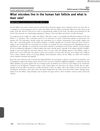 5 citations,
March 2020 in “Current Opinion in Endocrine and Metabolic Research”
5 citations,
March 2020 in “Current Opinion in Endocrine and Metabolic Research” Skin problems in PCOS, like excess hair, acne, and hair loss, may not always indicate high male hormone levels and need careful diagnosis for proper treatment.
[object Object] Lactobacillus and fermented Korean berry can help hair grow faster.
 April 2023 in “Journal of Investigative Dermatology”
April 2023 in “Journal of Investigative Dermatology” Taking nicotinic acid supplements might help with acne by affecting the skin's oil glands, but high doses are needed.
April 2019 in “Journal of Investigative Dermatology” Alopecia Areata patients have too many Firmicutes and too few Bacteroides in their gut.
April 2018 in “The journal of investigative dermatology/Journal of investigative dermatology” Interest in acne is rising, but research funding has significantly decreased.
 May 2021 in “British Journal of Dermatology”
May 2021 in “British Journal of Dermatology” Different tiny organisms live in human hair follicles and can affect both health and skin conditions, including acne and hair loss.
 April 2018 in “Journal of Investigative Dermatology”
April 2018 in “Journal of Investigative Dermatology” People with palmoplantar pustulosis, especially with bone issues, have different mouth bacteria compared to healthy people.
 November 2022 in “Journal of Investigative Dermatology”
November 2022 in “Journal of Investigative Dermatology” Butyrate helps hair grow longer, improves hair cell health, increases pigment production, and boosts hair's natural defenses.
 June 2017 in “Experimental dermatology”
June 2017 in “Experimental dermatology” Skin has a larger surface area than thought, certain skin cells improve skin flap survival, better trials for skin conditions in children are needed, Stevens-Johnson syndrome rates vary by age and race, and better skin barrier function may reduce inflammation in the elderly.
 2 citations,
December 2011 in “Annales de Dermatologie et de Vénéréologie”
2 citations,
December 2011 in “Annales de Dermatologie et de Vénéréologie” 2011 dermatological research found new skin aging markers, hair loss causes, skin defense mechanisms, and potential for new treatments.
 December 2024 in “Quality in Sport”
December 2024 in “Quality in Sport” Diet and lifestyle changes can help manage autoimmune diseases by reducing inflammation and supporting immune health.
[object Object]  February 2024 in “Journal of Education, Health and Sport”
February 2024 in “Journal of Education, Health and Sport” Different treatments for PCOS should be tailored to the individual, including lifestyle changes and various medications.
 June 2022 in “Research Square (Research Square)”
June 2022 in “Research Square (Research Square)” The conclusion is that metformin may be useful for treating various conditions beyond diabetes and that time-tracking analysis is a good way to review drug research.
June 2020 in “Journal of Investigative Dermatology” The symposium highlighted the importance of genetics in understanding and treating complex skin diseases.
 January 2016 in “Journal of Investigative Dermatology”
January 2016 in “Journal of Investigative Dermatology” Some cells may slow melanoma growth, a protein could affect skin pigmentation, a gene-silencing method might treat hair defects, skin bacteria changes likely result from eczema, and a defensin protein could help treat multiple sclerosis.
 May 2015 in “Journal of the American Academy of Dermatology”
May 2015 in “Journal of the American Academy of Dermatology” Certain drugs and supplements may contribute to hair loss in the frontal hairline in older women.
April 2017 in “The FASEB journal” Low selenium levels worsen health but increase lifespan in mice.
 April 2019 in “The journal of investigative dermatology/Journal of investigative dermatology”
April 2019 in “The journal of investigative dermatology/Journal of investigative dermatology” DHT may reduce inflammation caused by certain bacteria in skin cells.
 22 citations,
March 2018 in “American Journal of Clinical Dermatology”
22 citations,
March 2018 in “American Journal of Clinical Dermatology” New acne treatments show promise as alternatives to traditional therapies.
 10 citations,
June 2017 in “Experimental Dermatology”
10 citations,
June 2017 in “Experimental Dermatology” New hair loss treatments have evolved from understanding hair biology and patient needs.
 August 2024 in “Indian Journal Of Clinical Practice”
August 2024 in “Indian Journal Of Clinical Practice” A balanced diet and healthy lifestyle help manage PCOS symptoms.

New acne treatments like clascoterone and minocycline foam are effective, and using antibiotics carefully is important to avoid resistance.

 April 2017 in “The journal of investigative dermatology/Journal of investigative dermatology”
April 2017 in “The journal of investigative dermatology/Journal of investigative dermatology” Stress in hair follicle cells increases certain immune-related proteins, which might contribute to hair loss conditions.
 80 citations,
April 2018 in “Trends in Molecular Medicine”
80 citations,
April 2018 in “Trends in Molecular Medicine” Lichen Planopilaris and Frontal Fibrosing Alopecia may help us understand hair follicle stem cell disorders and suggest new treatments.
 70 citations,
February 2019 in “The journal of immunology/The Journal of immunology”
70 citations,
February 2019 in “The journal of immunology/The Journal of immunology” Short-chain fatty acids from *Cutibacterium acnes* cause skin inflammation, contributing to acne.
 54 citations,
January 2018 in “Scientific reports”
54 citations,
January 2018 in “Scientific reports” Human hair contains diverse proteins, including keratins and histones, which could help assess hair health and aging.
 44 citations,
March 2020 in “Antibiotics”
44 citations,
March 2020 in “Antibiotics” Rosemary extracts with carnosic acid and carnosol can reduce the harmfulness of Staphylococcus aureus without stopping its growth.
 27 citations,
April 2020 in “Journal of Experimental Botany”
27 citations,
April 2020 in “Journal of Experimental Botany” Glutathione helps Arabidopsis roots adapt to low phosphate by regulating a specific growth pathway.
 17 citations,
April 2020 in “Dermatology and Therapy”
17 citations,
April 2020 in “Dermatology and Therapy” The PRP-like cosmetic product with postbiotics effectively treats hair loss in Alopecia areata.

























